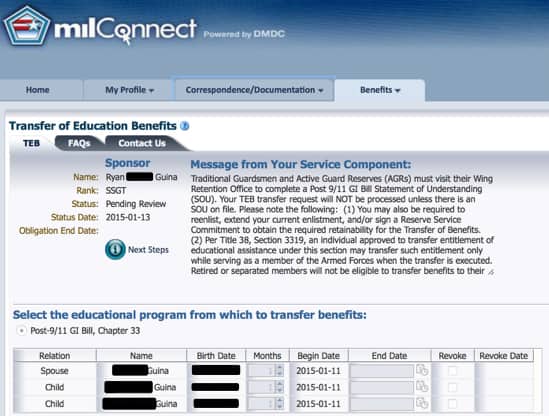Veteran Transfer Gi Bill To Child
If you're searching for picture and video information related to the key word you have come to pay a visit to the ideal blog. Our website gives you hints for viewing the highest quality video and picture content, hunt and find more informative video articles and graphics that fit your interests.
includes one of tens of thousands of video collections from several sources, especially Youtube, so we recommend this movie for you to view. This blog is for them to visit this website.

The Post 911 GI Bill which is the only GI Bill having a dependent transfer option covers sons but not grandsons.
Veteran transfer gi bill to child. Even then there will be minimum years. In short you must have at least 6 years in service and agree to extend your obligation by a minimum of 4 years. However the new 2008 GI Bill is going to be but they are not anticipating it happening prior to August of 2009. Am I eligible to transfer benefits.
Am I eligible to transfer benefits. You can only transfer benefits while you are in the military. So who is eligible for the GI Bill and how do they transfer it. If a dependent has received transferred entitlement and the Veteranservicemember dies the dependent may transfer his or her unused benefits to a different eligible dependent of the Veteranservicemember effective August 1 2018.
Qualifying immediate family members are spouses and children. This applies to officer or enlisted active duty and Selected Reserve. Still even if your husband had qualified for the Post-911 GI Bill he wouldve. Find GI Bill-Approved Colleges For Military and Veterans.
Previously there were no restrictions on when a service member could transfer educational benefits to their family members. If youre eligible for transfer at all youll be able to give up to 36 months or whatever is left unused of your Forever GI Bill Post 911 GI Bill or Montgomery GI Bill benefits to your spouse or dependent children. Effective July 12th 2019 eligibility to transfer GI Bill benefits was limited to service members with less than 16 years of total active-duty or selected reserve service as applicable. For privateforeign institutions there is a cap per academic year.
And unfortunately unlike the Post-911 GI Bill the Montgomery GI Bill was not transferable to family members. The Post-911 GI Bill allows Service members to transfer unused education benefits to immediate family members. Transfer your Post-911 GI Bill benefits Find out if you can transfer any of your unused Post-911 GI Bill benefits to your spouse or dependent children. The Department of Defense DoD decides whether you can transfer GI Bill benefits to your family.
Transfer your Post-911 GI Bill benefits Find out if you can transfer any of your unused Post-911 GI Bill benefits to your spouse or dependent children. There is good news for those of you out there who are eligible for the Post-911 GI Bill you may be eligible to transfer your GI Bill to a spouse or child if you meet the minimum service requirements and agree to extend your military service obligation. The Service member must have at least six years of service and commit to an additional four years in order to transfer benefits. Veterans can not under current law and DoD policy allowed to transfer their GI Bill to anyone.
Also if you havent used all of your Post-911 GI Bill benefits you may be able to transfer up to 36 months of benefits to your spouse or a dependent child. You must be on Active Duty and serve an additional 4 years to transfer or actively drilling with a Guard or Reserve unit and do the 4 additional years to transfer. This policy is set by. The only way a grandson could be covered would be if the grandfather would have legally adopted him but then he would have been considered a son.
Great news here on August 1 2009 the Department of Defense began permitting eligible Armed Forces members active duty or Selected Reserve officer or enlisted to transfer their remaining GI Bill Benefits to their wife husband or children. The Department of Defense DoD decides whether you can transfer GI Bill benefits to your family. The ability to transfer your GI Bill benefits to your spouse or child is only available to career service members which means its not an option thats available to service members amid their first enlistment or commissioned contract. There are certain GI Bill transfer eligibility requirements and rules you must meet in order to transfer your benefits to your spouse or children.
The traditional GI bill is not transferable. Learn more about transferring benefits.















